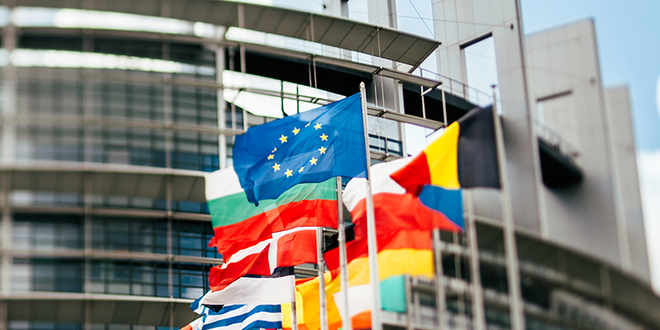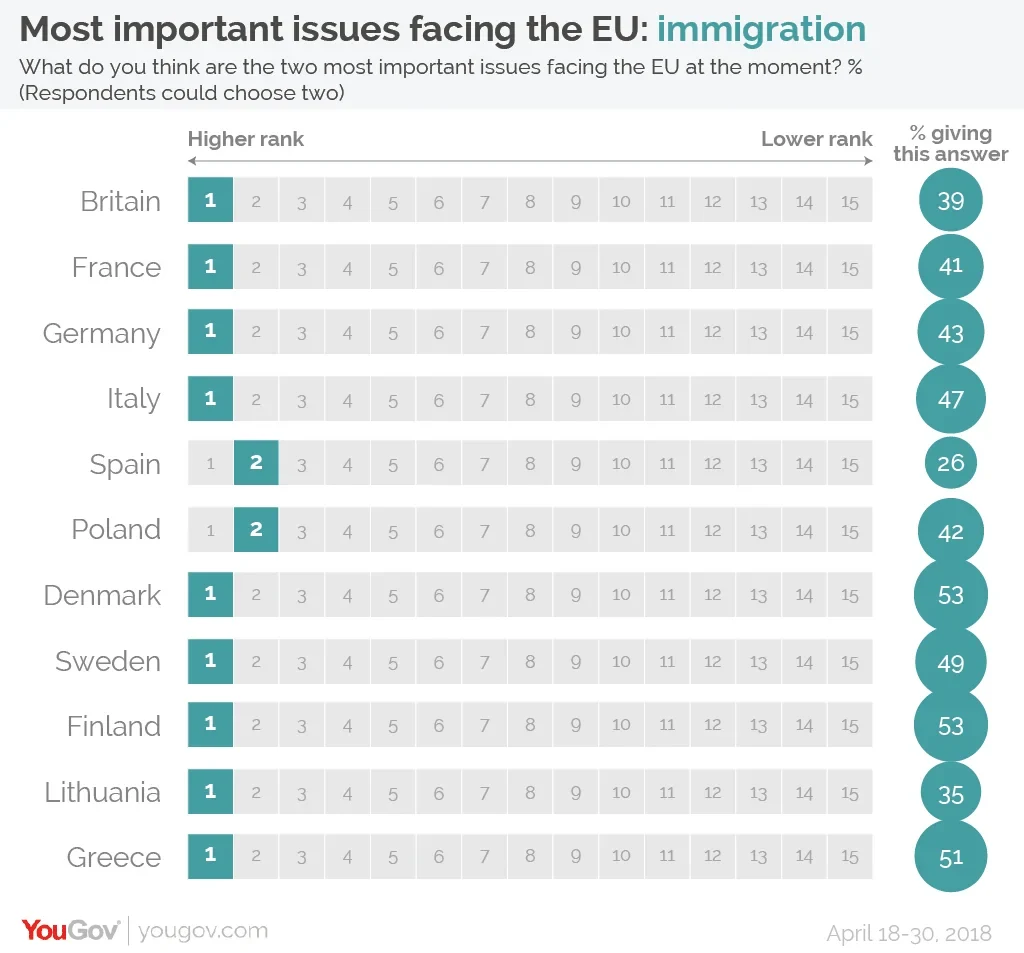
YouGov data reveals what Europeans think are the most important issues facing the EU
National publics in 11-country study consistently name immigration and terrorism as key issues facing the EU
For the State of the Union conference at the European University Institute in Florence this week YouGov has conducted new research in 11 EU states. It looks at what people think are the most important issues facing the European Union, whether they trust the EU or national governments more to address them, and how much support there is for giving help to other countries in the Union.
We polled the six largest EU countries (Britain, France, Germany, Italy, Spain and Poland), along with Denmark, Sweden, Greece and Lithuania, to ensure a broad coverage of different parts of the EU.
The most important issues facing Europe
The European Union remains a diverse Union with strong contrasts between the issues and concerns in different countries. In the three southern European countries we polled, unemployment is seen as the major issue, but this was less so elsewhere in Europe.
Terrorism is viewed as a major issue to respondents in Britain, France and Germany, whereas health and social security are considered major issues in northern European countries and Poland. Lithuanians are the only respondents where inflation emerged as the most important current issue, Sweden is the only country where crime came in the top three.
Similar patterns emerge when we ask about what the most important issues are facing the European Union as a whole. While southern European countries say unemployment, northern European countries are more likely to say the environment. Immigration and terrorism are the two issues that people across the EU see as important issues for the Union (even if they didn’t see them as important for their own countries).

Who is better placed to help?
There is not a huge difference between people’s trust in their national governments to help resolve issues and their trust in the EU to do the same. Climate change is the only area were people have significantly more trust in the European Union to improve matters (on average 32% of people trust the EU to make things better, compared to 27% for their own governments). When it comes to military defence and protection against crime and terrorism people are more likely to trust their own governments (although the gap is quite small).
The differences between countries is much larger. While there are some trends (for instance, countries in northern and western Europe tend to have more trust in their own governments than the EU, while the opposite in eastern and southern Europe), this probably reflects the different levels of confidence people in each country have in their own national government.
In Denmark, the level of trust in national government to make things better is, on average, ten percentage points higher than trust in the EU, in Sweden the gap is nine points, in Britain and France it is seven. At the other end of the scale, the level of trust in the EU to improve matters is eleven points higher than their trust in their own government, while in Greece the gap is seven points.
How willing are people to help other EU countries in need?
When it comes to attitudes towards EU solidarity and intervention there is a contrast between northern and western Europe on one hand, and eastern and southern Europe on the other. This distinction is one that largely (but not entirely) reflects the difference between those EU countries who pay more into the EU budget than they receive, and those who get out more than they pay.
Asked to place themselves on a 0-10 scale, with zero being caring only about their own country and 10 being caring about all EU countries equally, the average score in Western/Northern Europe is 4.7, while in Southern/Eastern Europe it is 6.3.
This same difference is apparent when we look at some specific examples – such as whether European Union countries should offer help if another EU country faced a crisis with debt, unemployment, immigration, or a natural disaster. On average, 62% of respondents in southern and eastern Europe think that member states should offer help, compared to 47% of respondents in northern and western Europe.
However, there are some interesting contrasts depending on the type of crisis. An overwhelming majority say European Union countries should help if another member faced a natural disaster, as do most people were another EU country to face an influx of refugees. People are less willing to see Union members give help if another country faces a problem with unemployment, or unaffordable debt.
People in the northern EU member states are also less likely than their southern counterparts to support increased money raising and spending by the EU – with one interesting exception.
In addition to people in southern Europe, German respondents also support more EU taxes and spending. One assumes respondents in southern countries support increased EU tax and spending because they perceive their countries as more likely to be net recipients. Meanwhile, German respondents may believe that supporting increased EU taxation may spread the costs around more evenly than the large current German contribution.
Photo: Getty